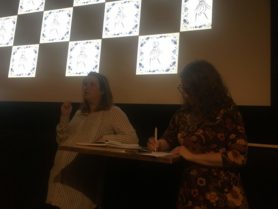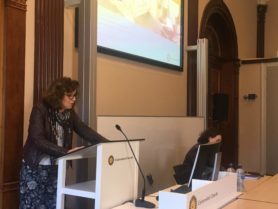News
BLOG: Expert Meeting review
April 14, 2019.
On April 10th 2019, our project group held an Expert Meeting on the theme “Narrative and Conversion”. In a beautiful meeting room, tucked away in an upstairs corner of the university’s historic humanities building, prof. Anne-Marie Korte kicked off proceedings by discussing the choice of “narrative” for the day’s theme. Narrative appears again and again as a key register in processes both of conversion and de-conversion. Conversion might, therefore, be conceptualised as a form of story telling.
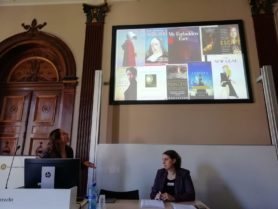
In a keynote lecture that brought the idea of narratives of conversion to life, dr. Karen Skinazi discussed, with humour, the ways in which conversion from, to and within Judaism are presented in conversion stories. In her lecture, Skinazi shed light on the complexity and variety of conversion narratives connected to Orthodox Judaism. The tone of these narratives ranges from cautionary to parodic, and from fearful to optimistic. Skinazi’s lecture brought an array of material (TV, film, literature, real life incidents) into dialogue with religious/secular binaries, narratives of gender in and about Orthodox Judaism, and the conceptualization of “freedom”.
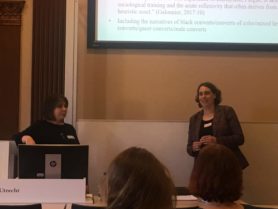
In the day’s second keynote lecture, we turned our attention from Orthodox Judaism to Islam, to hear dr. Vanessa Vroom-Najem discuss conversion to Islam in the Netherlands. Vroom-Najem noted that, in exploring the “politics of belonging”, her research has often brought her into contact with different narratives of belonging. Vroom-Najem observed that her interlocutors usually begin with “experimental” forms of Islam (e.g. fasting at Ramadan, learning to pray, changing their dietary habits, modes of dress), and therefore narrate their conversion through embodied, everyday practice. Vroom-Najem drew an important distinction between binary narratives that are propounded about converts, and the counter-narratives of converts themselves (who might not, for example, see their conversion as a radical break with the past, but rather a process of continuity).
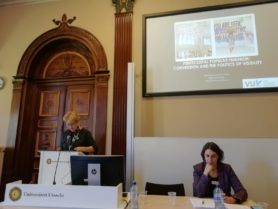
After a short break, we returned to hear the day’s third, and final, keynote lecture, given by dr. Miranda Klaver, on Pentecostal popular feminism. In this lecture, Klaver also explored the theme of embodied narrative. However, this time, the discussion centred around the shared narrativity of language and performance, on the one hand, and digital media constructions, on the other. Klaver took the example of three members of the Houston family, high-profile figures in the Hillsong Church, and discussed both how they narrate their conversions and the significance of their “hypervisibility” on social media sites (notably, Instagram).
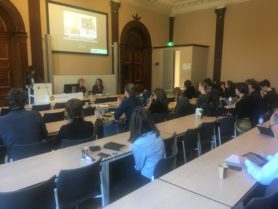
From these three keynote lectures, it was possible to begin to see threads of similarity between ostensibly very different fields of research, offering food for thought about the possibilities within comparative study of conversion narratives in Christianity, Judaism, and Islam. One prominent thread throughout the day was embodied narratives of conversion (often with gendered and/or racialised dimensions). Another interesting dimension of the day’s discussions was a recurrent concern with what “freedom” and “oppression” look like. Skinazi noted a recent trend for women who have left Orthodox Jewish communities to publish commercially successful autobiographies. While not necessarily a “bad thing”, Skinazi seemed to indicate that the way in which such autobiographies are lauded reflects the ongoing popularity of the narrative of the “oppressed religious woman” who has escaped or been saved and now enjoys “secular freedom”. Likewise, Vroom-Najem’s emphasis on convert counter-narratives reflected the need to deconstruct binary narratives. Klaver’s lecture sparked a lively debate, which flowed into our plenary discussion, concerning the regulation of women’s bodies within the beauty industry, which seems to run in tension with the narrative of “hypervisibility” as empowerment, and “invisibility” as oppression, within the Hillsong Church.
During the meeting’s evening programme, a bilingual screening and discussion of the documentary “Delfts Blauw Meets Hijab”, I was struck again by the centrality of questions of how freedom and oppression “ought” to be narrated. During the documentary, one of the converts explains that she is conservative and does not want the “freedoms” afforded to her by the parent’s generation. However, the documentary closes with a shot of the same convert walking into the distance, as she is heard explaining that, in Islam, she has found “freedom”. This turns the idea of Western secularism as the sole “guardian” of freedom on its head, and seemed to me to be the perfect narrative with which to conclude the day’s complex and fruitful discussions.
